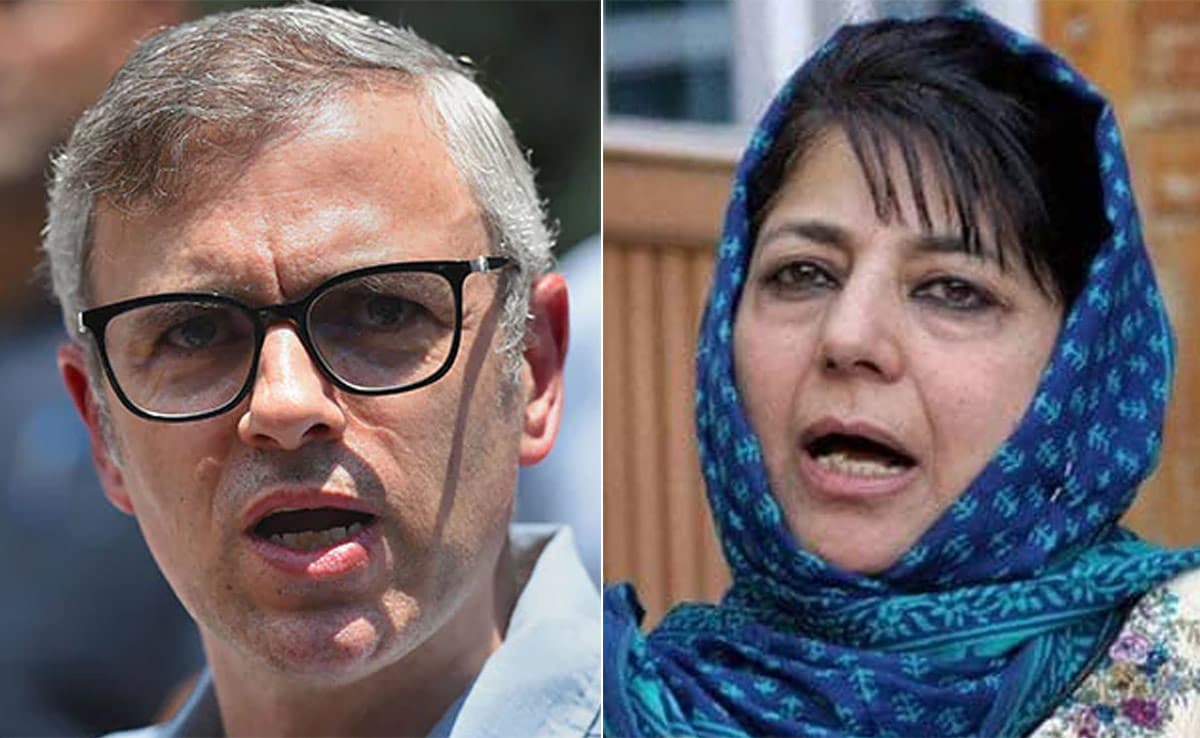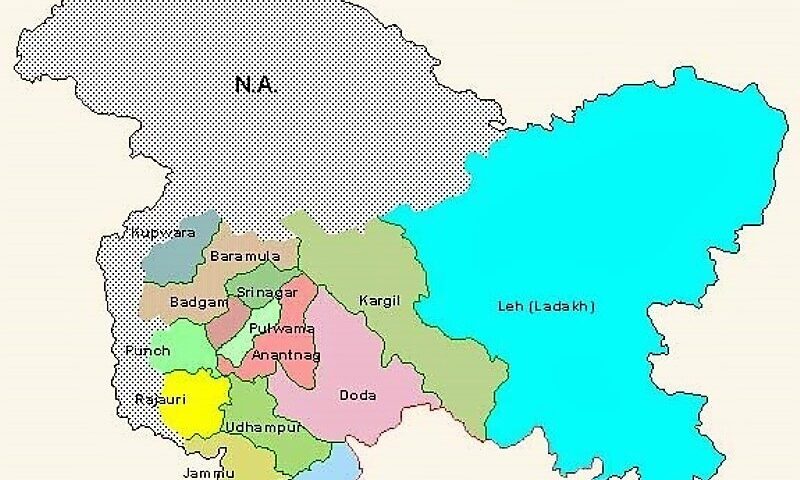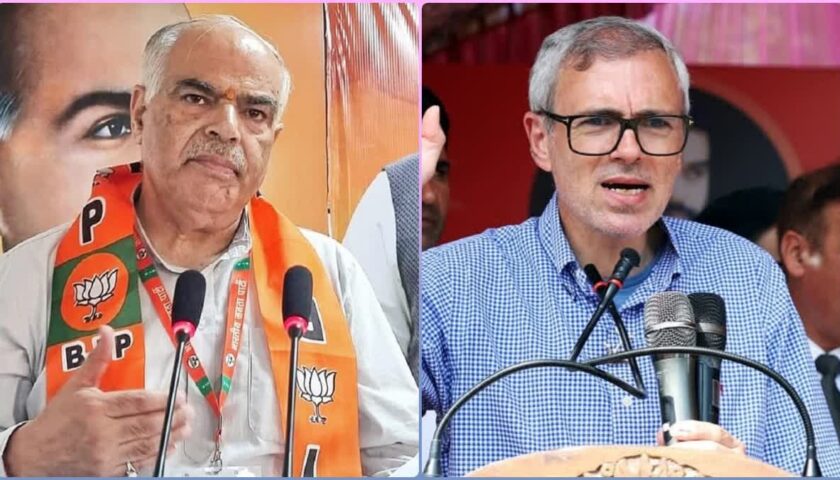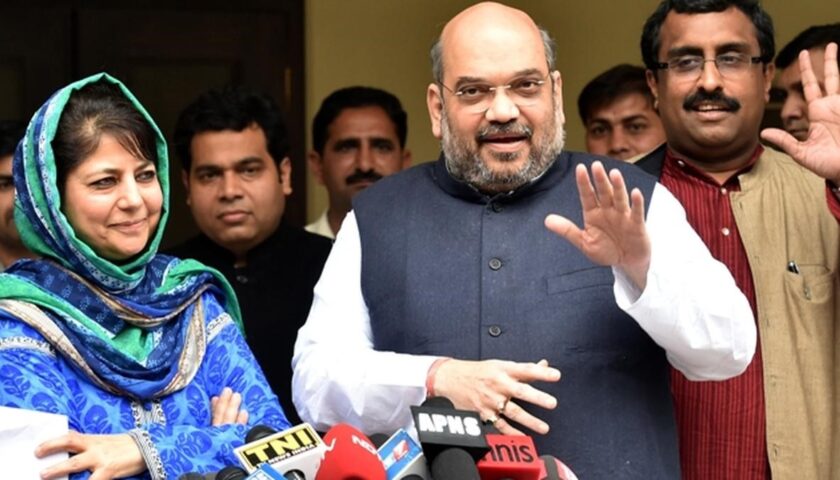Omar Abdullah calls out Mehbooba Mufti and Sajad Lone for their silence on reservation reforms during their time in power
By: Javid Amin | Srinagar | 21 June 2025
A Fresh Storm in J&K Politics
Jammu and Kashmir’s volatile political terrain has found a new battleground: the reservation policy. Once a relatively subdued aspect of governance, the issue has taken center stage as former Chief Minister and National Conference (NC) vice-president Omar Abdullah accused rival leaders Mehbooba Mufti of the Peoples Democratic Party (PDP) and Sajad Lone of the Peoples Conference of “political hypocrisy.”
His criticism, sharp and direct, points to the alleged double standards of these leaders—who, according to him, did little to reform or challenge the reservation system when they held or shared power. The remarks have sparked a region-wide political storm, drawing attention to not just party politics but to broader questions of justice, merit, identity, and representation in post-Article 370 J&K.
But beyond the headlines, what exactly is the reservation controversy all about? Who stands to gain, who feels betrayed, and why has it become such a divisive issue on the eve of J&K’s long-awaited democratic elections?
The Spark: Omar’s Accusations and Political Reactions
In a public address that made waves across political circles, Omar Abdullah took aim at Mehbooba Mufti and Sajad Lone. He alleged that Mehbooba, while contesting elections from Anantnag and seeking support in Rajouri and Poonch, actively discouraged her party from speaking about reservation reform—despite the fact that these regions are directly impacted by ST and OBC quotas.
He also slammed Sajad Lone for his silence during his five-year proximity to the ruling establishment. “He said nothing while others were being evicted from official residences or stripped of security,” Omar remarked, referencing administrative clampdowns that affected rival leaders and bureaucrats.
Mehbooba Mufti was quick to respond. She defended her government’s record, stating that during her tenure, 75% of medical seats under NEET were reserved for open merit—an indicator of her administration’s commitment to fairness. Her daughter, Iltija Mufti, went further, accusing Omar of making “false promises” and failing to follow through on critical reforms during his own time in office.
Sajad Lone, characteristically more reserved, has yet to offer a comprehensive rebuttal—though party sources suggest he is “monitoring the situation closely.”
What Triggered the Reservation Crisis?
The roots of the current crisis lie in a Cabinet Sub-Committee report submitted recently to the J&K administration. This report, which examined existing reservation structures, is currently under legal vetting by the Law Department. Critics accuse the government of “delaying transparency” and attempting to “buy time” ahead of the 2025 elections.
Meanwhile, public sentiment is heating up. The report’s contents—though not officially released—are believed to propose adjustments to the share of Scheduled Tribes (STs), Other Backward Classes (OBCs), and Pahari-speaking communities. This has triggered fears among Gujjars and Bakarwals (existing STs) that their hard-won quota could be diluted.
At the heart of the issue is the inclusion of Pahari-speaking people under the ST category—a move widely seen as politically motivated but administratively opaque. The lack of clarity has given rise to a deluge of protests, petitions, and political mudslinging.
Historical Roots of J&K’s Reservation System
Reservation in Jammu & Kashmir has a uniquely complex history. Unlike other Indian states, J&K enjoyed special constitutional autonomy under Article 370 until 2019. This allowed the state to formulate its own reservation laws—some of which deviated from national norms.
Historically, the Dogra monarchy practiced limited forms of affirmative action, mainly for religious minorities. Post-independence, successive state governments introduced broader reservation policies, including for Scheduled Castes (SCs), STs, and socially and educationally backward classes.
The 1991 inclusion of Gujjars and Bakarwals under ST was a watershed moment—but it left out other marginalized groups like Paharis. This omission became a source of long-standing resentment and political lobbying, especially in districts like Rajouri, Poonch, Kupwara, and Baramulla.
Post-Article 370 Changes and Fallout
The abrogation of Article 370 in August 2019 opened the floodgates for sweeping legal changes in J&K. One of the biggest shifts came in the form of reservation realignment. With the region now under the Indian Constitution, national reservation rules—including EWS quotas—could be applied uniformly.
The inclusion of Pahari-speaking people in the ST category was pushed through by the Centre as a form of “corrective justice.” However, Gujjars and Bakarwals viewed this as a betrayal. Unlike them, they argue, Paharis are not nomadic, do not suffer from the same educational disadvantages, and are already more politically influential.
The backlash was immediate—and sharp. Protests erupted across Gujjar-dominated areas, with leaders warning that the move could “fracture tribal unity.” Simultaneously, Pahari organizations held celebratory rallies, calling the decision “historic.”
Who Gains, Who Loses – The Beneficiary Debate
With new inclusions come new anxieties. Gujjars and Bakarwals fear that their quota pie will shrink. Paharis, meanwhile, argue that they have long been deprived of rightful representation. SEBCs and general category youth have begun questioning the fairness of the entire reservation apparatus, which they say is becoming more about identity politics than actual deprivation.
The result is a zero-sum game in which every community is vying for a larger share of a limited resource—whether in education, employment, or political representation.
Legal and Constitutional Challenges
The legal framework surrounding the ST inclusion of Paharis is fraught with ambiguity. Experts argue that the central government’s decision must be backed by empirical data and a recommendation from the National Commission for Scheduled Tribes (NCST). If either is missing or flawed, the policy could be struck down in court.
Moreover, the absence of an elected legislature in J&K raises serious questions about democratic legitimacy. Can such sweeping changes be enacted by an unelected bureaucracy? Critics say no.
Public Reactions and Civil Society Mobilization
The issue has ignited a storm on the streets and online. Gujjar and Pahari groups have staged parallel protests. Youth-led campaigns like #MeritMattersJK are gaining traction. NGOs, civil rights groups, and student unions are demanding a socio-economic caste census, creamy layer introduction, and community consultations.
Even panchayats in border areas have passed resolutions calling for transparency and fairness. The demand for clarity has never been louder—or more diverse.
Media Coverage, Narratives, and Misinformation
The media landscape is a battleground. While regional dailies attempt balanced reporting, national TV channels have sensationalized the debate. Social media is rife with fake news, misrepresented data, and provocative narratives.
To counter this, initiatives like Truth4JK have emerged, verifying facts and countering disinformation. However, the damage is often already done, with panic and misinformation spreading faster than correction.
What’s at Stake in 2025 Elections
The reservation row is now inextricably tied to the upcoming elections. For the BJP, it’s a showcase of inclusive governance. For the NC and PDP, it’s a narrative of betrayal and missed opportunities. For Sajad Lone, it’s a chance to either rise or recede, depending on how convincingly he engages the issue.
The electorate is watching closely. Reservation reform will not just decide policy—it may very well decide power.
The Road Ahead – Reform or Regression?
So, where do we go from here?
The only sustainable path forward is reform rooted in data, dialogue, and justice. That means conducting a comprehensive socio-economic caste census, engaging stakeholders in policy-making, and introducing accountability mechanisms like creamy layer filters.
Above all, political maturity is required. Leaders must rise above vote-bank compulsions and craft policies that reflect not just immediate gains but long-term equity.
If done right, this could be J&K’s opportunity to set a national example. If mishandled, it risks turning into a prolonged crisis with dire consequences for regional peace and governance.




